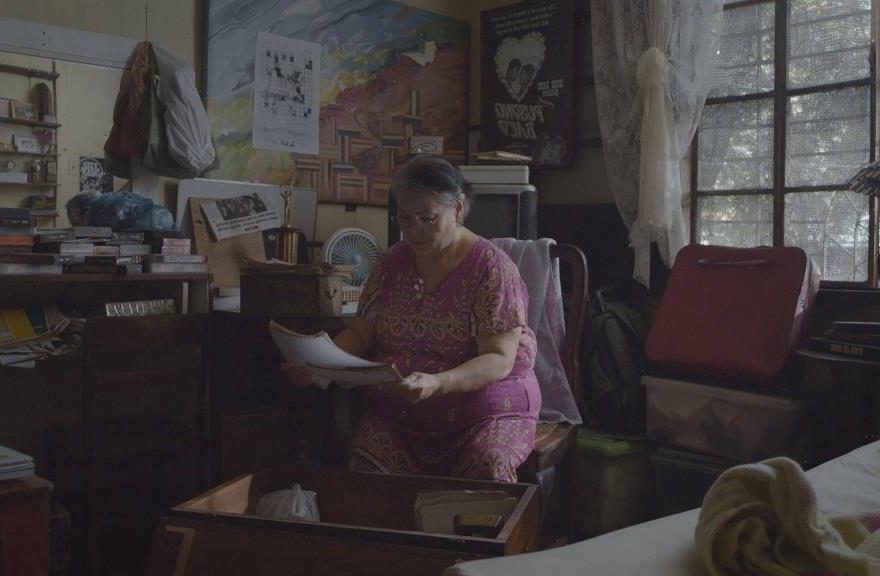From its opening minutes, Martika Ramirez Escobar’s meta-prank “Leonor Will Never Die” aims to scramble the viewers. Leonor Reyes (Sheila Francisco), an elderly retired action film director in Manila who, the title assures us, must have some claim to immortality, pads into view from the knees-down and steps onto a trunk – the universal film cliché for suicide. Not so fast, but it is true that awful things have happened to Leonor. Her ex-husband Valentin (Alan Bautista), a former movie star, has left. Her favorite son Ronwaldo (Anthony Falcon) is dead. And her least-favorite son Rudie (Bong Cabrera) is hounding her to pay the electric bill, which is three months past due and would have already been shut off if Leonor hadn’t helmed the meter reader’s mother’s favorite shoot-em-ups.
If life was one of Leonor’s films, she could write a happy ending. (Though, given her filmography, it’d have to be solved by a machine gun.) Instead, Leonor consoles herself by talking to her dead son’s ghost, who wafts through scenes, opinionated and semi-transparent, until she’s stricken by something worse: a TV flung from an apartment window that knocks Leonor unconscious and plummets the old woman into her own Oz. Like Dorothy stepping from black and white into color, the aspect ratio shrinks, a slap bass bops, and we realize that Escobar has plunged Leonor into one of her own half-written screenplays.
In Leonor’s crumpled thriller, government assassins have conveniently offed a character inspired by her pesky son, while her best son has been resurrected in the form of a flawless film star (Rocky Salumbides, a model discovered on “Pinoy Big Brother”), also named Ronwaldo, who sets out to avenge the family. For kicks, Movie Star Ronwaldo also rescues a burlesque dancer named Majestika (Rea Molina), who sashays into the film wearing a bikini made of artificial flowers, which she plucks off and tosses into the crowd.
As for interloper Leonor, she is, in essence, playing herself: a gray-haired woman in a house dress and flip-flops, who navigates a hellfire of bullets she herself has wrought. Onscreen, Leonor is half-victim, half-god. She’s protected by her idealized boy while able to predict lines of dialogue and, gradually, coming to acknowledge the pain and violence roiling in her subconscious. What kind of creator would invent the tortures she’s put on the page? What does she really need to work through? Or, as a doomed character asks, “How do I know you’re not the bad guy?”
Leonor’s adventures in the film within the film — “Ang Pagbabalik ng Kwago,” or “The Return of Kwango” — play like an affectionate sendup of cornball heroics. The punches whiff, the sound effects are clumsy, and the score by Alyana Cabral and Pan De Coco is deadpan hysterical. But Escobar is after something deeper than parody. She wants audiences to question how fictional strongmen have been idealized as real-world saviors. It’s a problem relevant not just to Americans who have elected Reagan, Schwarzenegger and Trump, but to Escobar’s home country of the Philippines, which also elected an action star to the presidency (he was impeached for embezzling $80 million) and is currently led by a tough-talking brute who brags about murdering his own citizens. (As for those running to replace the president in 2022, one of the top candidates is boxer Manny Pacquiao.)
“Leonor Will Never Die” is creative and clever — perhaps too clever as the film fractalizes into a hall of mirrors where even Escobar and her editor Lawrence S. Ang can’t resist barging on screen to ask each other how it should end. (They decide on a musical number, for no other reason than the fact that they can.) By that point, the script’s ambitions have outreached its grasp, even with the formidable Francisco holding the stories’ layers together. Her Leonor is stubborn and often maddening. At first, she grins when goons get whacked, and creeps into other people’s sex scenes as though she has every right to spy. But as her own script shifts from needing a fake hero to needing real-life her, Leonor steps forward without fictionalizing a thing about herself. She’s a gray-haired retiree with a hammer in her hand and tears in her eyes. She’s not the savior most people would have written for the screen — herself included — but a woman willing to seize control of her story.
Source: Read Full Article
